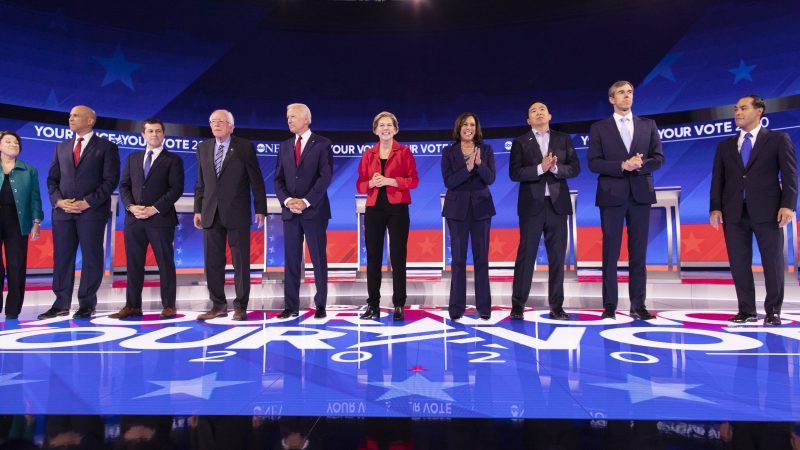The Democratic Debates So Far: Nearly 300 Questions, but None About the National Debt
Will tonight be any different or more of the same?

The first three rounds of Democratic primary debates have lasted a total of 12 hours, included 21 different presidential candidates, and have featured 297 questions from moderators.
Here's a number that hasn't come up, not even once: $22 trillion—the size of the national debt.
"It's a crowded time, obviously, in the policy and political arena," says Maya MacGuineas, president of the Committee for a Responsible Federal Budget (CRFB), a nonpartisan, nonprofit group that advocates for balanced budgets. "But moderators are going to have to push these candidates at some point to address the growing federal budget deficit and the national debt."
Will tonight's fourth presidential debate—scheduled for 8 p.m. and featuring a record 12 candidates sharing the stage in Westerville, Ohio—give some attention to the national debt? Don't hold your breath. If the earlier debates are any indication, candidates will be trying to outdo one another with promises of government-funded "freebies" like college tuition and health care. To the extent that questions of spending have found a footing in the debates so far, it's been candidates calling out one another for price tags on various health care proposals.
Even the candidates who are trying to show they would be able to pay for new spending plans are actually just promising to increase the national debt. Take Elizabeth Warren (D–Mass.), who takes the stage tonight as the frontrunner in the field. She's pitched a "wealth tax"—it would be a 2 percent annual tax on assets for households worth more than $50 million, plus a 1 percent surtax on households with a net worth of $1 billion or more—that wouldn't even cover all the new spending she's proposed, as Reason's Peter Suderman has explained.
"A sound fiscal situation is the basis for everything else these candidates want to talk about," says MacGuineas.
Even if Warren and the rest could make the math work for their new spending proposals, that wouldn't do anything about the nearly $23 trillion already owed. Relative to the size of the economy, America is carrying more debt now than at any time since the end of World War II. Meanwhile, the budget deficit—the gap between how much revenue the federal government takes in and how much it spends in a single year—is higher than it has ever been during periods of strong economic growth.
Though the Treasury Department has not yet published final figures for the fiscal year that ended on September 30, the Congressional Budget Office estimates that the budget deficit was $984 billion. That's more than double the $442 billion deficit in the final year of President Barack Obama's term in 2015.
That report would be a good hook for a debate question, right? Well, you'd have thought the same thing a month ago, when the Democrats' last debate coincided with the bipartisan passage through Congress of a $2.7 trillion spending deal expected to add about $1.7 trillion to the national debt in the next decade. It never came up during that debate, however.
Given the astounding rate at which the federal government spends money, the 12 hours of Democratic primary debates translate to about $1.3 billion in deficit spending, according to data from the Campaign to Fix The Debt, a CRFB project.
There will be three more hours of debating tonight. That's another $300 million, approximately, that will be added to the nation's tab. Probably not worth talking about.


Show Comments (54)